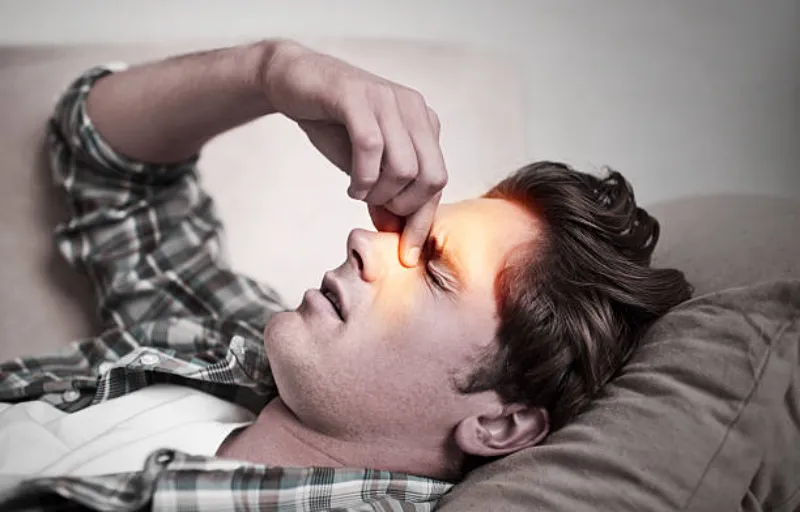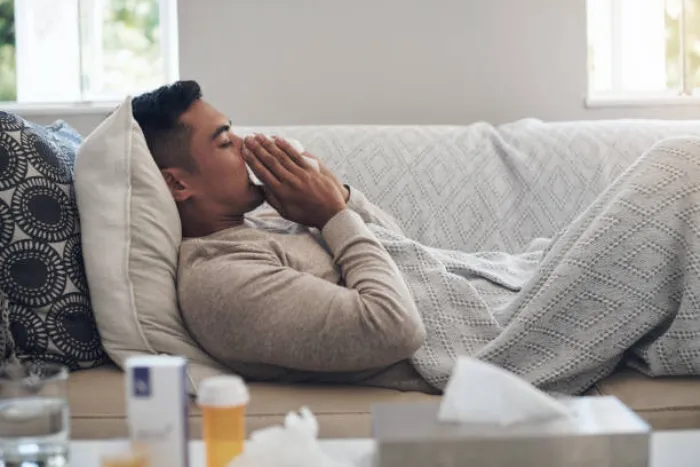Sinus infections can be a real pain in the nose, quite literally. They can make you feel miserable, and it’s no secret that they can also make it difficult to get a good night’s sleep. But don’t lose hope because there are tricks to help you breathe easy and finally get the restful night you deserve.
Elevating your head while sleeping can be incredibly beneficial. This simple adjustment can promote mucus drainage from your sinuses, decreasing inflammation and congestion.
To ensure a good night’s sleep, it’s essential to avoid alcohol and caffeine before bedtime. These substances can interfere with your sleep, causing restlessness and dehydration.
Let’s dive into some excellent suggestions for catching a good night’s sleep when a sinus infection keeps you up all night. Get ready to get some sweet sleep.
Things You Need to Do to Sleep When You’ve Got a Sinus Infection
Discover the essential steps for getting a good night’s sleep with a sinus infection by exploring the following tips:
1. Elevate Your Head
Propping up one’s head at an elevated angle is a potential remedy for alleviating congestion and pressure, which may benefit those experiencing discomfort in the upper respiratory system. This can be achieved by using a few extra pillows to elevate the head or trying a wedge pillow.
Ensuring your head is elevated enough to keep the sinuses above the heart is important. Doing so reduces the mucus accumulating in the sinuses, making it easier to breathe and sleep.
Sleeping in an elevated position can also help reduce the pressure on the sinuses, alleviating your pain and discomfort. This is particularly important for those with a sinus infection as it can help to reduce inflammation and swelling.
2. Use a Humidifier
Adding moisture to the air with a humidifier can help alleviate nasal congestion and discomfort by keeping the nasal passages moist. When the air is dry, the mucus membranes in the nasal passages can become dry and irritated, causing inflammation and congestion.
A humidifier helps to add moisture to the air, making it easier to breathe, reducing the risk of infection, and improving the overall condition of the sinuses.
By maintaining the proper humidity level, a humidifier can also prevent bacteria and mold growth, similar to how watering a plant can prevent the soil from drying out. You should clean your humidifier regularly to prevent bacteria from growing.
To ensure that your humidifier is providing the intended benefits, it is recommended to use distilled water, as tap water can contain minerals and other impurities that can harm your health.
3. Keep Your Bedroom Clean
Maintaining a clean and allergen-free bedroom environment through the use of dust-proof covers and pet exclusion can aid in reducing nasal congestion and discomfort. Allergens such as dust, pet hair, and pollen can exacerbate sinus pain and congestion, making sleeping difficult.
Using dust-proof covers for pillows and comforters can prevent dust mites from accumulating and causing irritation. Vacuuming carpets and drapes frequently can also remove any dust or allergens accumulated there.
Also, keeping pets out of the bedroom can help reduce the amount of pet dander and hair present, which can also trigger allergic reactions.
4. Avoid Alcohol and Caffeine
The avoidance of alcohol and caffeine consumption can contribute to the reduction of nasal congestion and discomfort. Thereby promoting a more comfortable and restful sleep for those affected by sinus issues.
Alcohol, in particular, can lead to a worsening of sinus symptoms due to its dehydrating effects. The nasal passages can dry and irritate when the body dehydrates, leading to increased congestion and discomfort.
Also, alcohol can dilate blood vessels, leading to increased blood flow and inflammation in the nasal passages.
Conversely, caffeine can cause vasoconstriction, or the tightening of blood vessels, which can also exacerbate sinus issues by reducing blood flow and oxygen to the affected areas.
5. Stay Hydrated
Ensuring proper hydration levels throughout the day can aid in maintaining thin mucus and facilitating its clearance, which can contribute to reducing discomfort associated with nasal congestion.
A sinus infection can cause the production of thick mucus, which can make breathing difficult and disrupt sleep.
Drinking plenty of water, at least eight 8-ounce glasses a day, can help thin out mucus and prevent it from accumulating in the nasal passages.
Consuming fluids such as herbal tea, broth, and fruit juice can also contribute to maintaining hydration levels and soothing sinus inflammation.
6. Use over-the-counter Medications
Over-the-counter medications can relieve sinus pain and congestion, improving comfort and easier breathing. You should use over-the-counter medications cautiously and as directed.
Any new medication should be discussed with your healthcare provider, especially if you have underlying health conditions or are taking other medications that might interact with them.
Also, overuse of certain medications may lead to rebound congestion or other adverse effects, so following the recommended dosages and duration of use is important.
Can I sleep on my side with a sinus infection?
The position in which one sleeps can affect congestion levels during times of upper respiratory tract inflammation.
Sleeping on your side can increase congestion on that side, which can exacerbate symptoms of a sinus infection. This is because gravity can cause mucus to build up and accumulate in the nasal passages, making breathing more difficult.
It is therefore recommended to sleep on your back with the head elevated to reduce congestion and improve breathing. Using an extra pillow or elevating the head of the bed can help achieve this position.
Will sleep help heal my sinus infection?
Getting enough sleep indirectly supports the healing process of a sinus infection. Adequate rest helps boost your immune system, which is critical in fighting off infections. But sleep alone may not cure a sinus infection.
Treatment typically involves addressing the underlying cause with medication, such as antibiotics or decongestants. Home remedies like steam inhalation or nasal irrigation may also help manage symptoms.
While sleep can alleviate some symptoms associated with sinusitis, such as fatigue, headaches, and congestion, it is not a cure for the infection itself. It is essential to seek medical advice if you suspect you have a sinus infection.
Should I take a sleeping pill if I have a sinus infection?
It is understandable to consider taking a sleeping pill when experiencing difficulty sleeping due to a sinus infection. But, consult with a healthcare provider before taking any medication, especially if underlying health conditions or other medications are being taken.
Natural remedies such as steam inhalation or nasal saline irrigation may help alleviate symptoms and promote better sleep. In cases where natural methods are ineffective, a sleep aid like Zopiclone may be considered, but only under the guidance and supervision of a healthcare provider.
Ease Sinus Infection Symptoms and Sleep Better Tonight
Sinus infections can be a nightmare, robbing you of restful sleep. By following the steps discussed above, you can alleviate symptoms and get the sleep you need.
Elevate your head, use a humidifier, keep your bedroom clean, nix alcohol and caffeine, stay hydrated, and try acupressure.
Over-the-counter medications can also lend a helping hand. Get ready to catch some sleep. These tips will help you score a cozy and peaceful night’s sleep.





